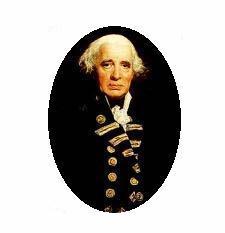

 Richard Howe was born in London on March 8th 1726 and was the second of three brothers born into a noble family name. He progressed to a famous career in the Royal Navy, quickly receiving promotion to Captain at 20 years of age and recognised for his cunning strategies during the "Seven Years War". His name is for ever linked with the victory over the French Revolutionary Fleet in the battle on June 1st 1794, although he was not able to stop the convoy of 130 merchant ships with cargoes of grain and other commodities it was escorting, reaching Brest in Brittany. The battle resulted in 7,000 dead or wounded French and 1,000 British, however he captured six enemy ships and sunk one. Several medals, "tokens" and "farthings" (described in the text) were minted in memory of this battle. They show, on the obverse the bust of Earl Howe, and on the reverse a variety of designs commemorating the day of the battle or other aspects of the conflict. The British were very concerned over the state of affairs resulting from the French Revolution so close to it's borders. This is reflected by the issue of the satirical token which is also shown and described in this narrative. The humorous British point of view is expressed on the reverse of this token, as is their serious concern at the bad condition of France due to the 1794 revolution which occurred during the same year as the fateful battle. Admiral Richard Howe died on August 5th 1799.
Richard Howe was born in London on March 8th 1726 and was the second of three brothers born into a noble family name. He progressed to a famous career in the Royal Navy, quickly receiving promotion to Captain at 20 years of age and recognised for his cunning strategies during the "Seven Years War". His name is for ever linked with the victory over the French Revolutionary Fleet in the battle on June 1st 1794, although he was not able to stop the convoy of 130 merchant ships with cargoes of grain and other commodities it was escorting, reaching Brest in Brittany. The battle resulted in 7,000 dead or wounded French and 1,000 British, however he captured six enemy ships and sunk one. Several medals, "tokens" and "farthings" (described in the text) were minted in memory of this battle. They show, on the obverse the bust of Earl Howe, and on the reverse a variety of designs commemorating the day of the battle or other aspects of the conflict. The British were very concerned over the state of affairs resulting from the French Revolution so close to it's borders. This is reflected by the issue of the satirical token which is also shown and described in this narrative. The humorous British point of view is expressed on the reverse of this token, as is their serious concern at the bad condition of France due to the 1794 revolution which occurred during the same year as the fateful battle. Admiral Richard Howe died on August 5th 1799. 
 |
 |
 |
 |
 |